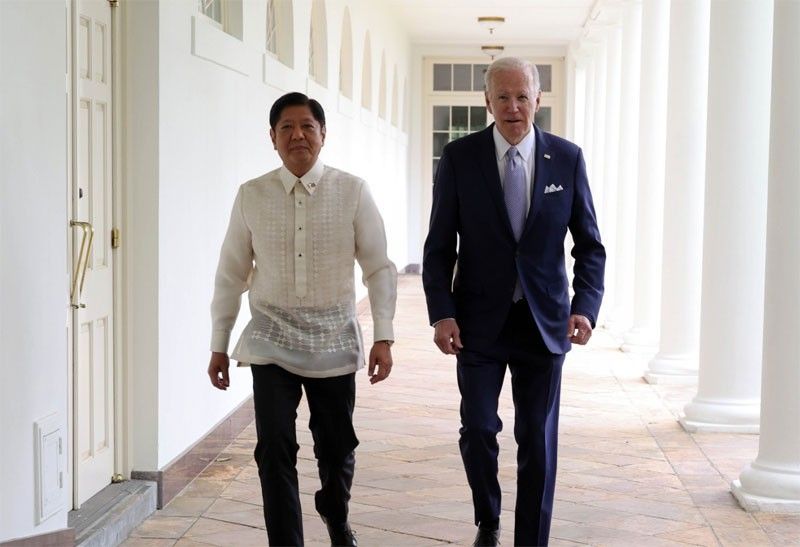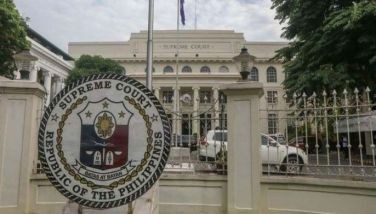Biden: No better partner than Philippines

WASHINGTON – US President Joe Biden said he “can’t think of any better partner to have than” President Marcos, as they held a bilateral meeting on Monday headlined by regional security issues spawned by China’s aggressive activities in the South China Sea.
“You know, when we met in New York last year, you told me that a strong alliance has to continue, quote – I’m using your phrase – ‘to evolve as we face the challenges of this new century.’ And we are facing new challenges. And I can’t think of any better partner to have than you,” Biden told Marcos at the start of their meeting at the White House.
He was referring to their first face-to-face meeting on the sidelines of the United Nations General Assembly meeting in September last year.
In his opening statement, Biden said the Philippines and the US share not just a strong partnership but “a deep friendship” as well.
“The United States also remains ironclad... in our commitment to the defense of the Philippines, including the South China Sea, and we’re going to continue to support the Philippines’ military modernization goals,” Biden said.
Marcos, for his part, cited the need to find ways to strengthen alliances and partnerships as the port-pandemic world faces geo-political issues.
“Beyond that, there are also the issues, geopolitical issues that have made the region where the Philippines is, possibly, arguably the most complicated geopolitical situation in the world right now,” the Philippine leader said.
“And so, it is only natural... for the Philippines to look to its sole treaty partner in the world, to strengthen and to redefine the relationship that we have and the roles that we play in the face of those rising tensions that we see now around the South China Sea and Asia-Pacific and Indo-Pacific regions,” he added.
The South China Sea, a busy sea lane where more than $5 trillion in goods pass through every year, is the subject of a longstanding maritime row involving China, which claims virtually the entire area, and the Philippines, Malaysia, Vietnam, Brunei and Taiwan, which have overlapping claims.
An arbitral court based in The Hague invalidated in 2016 China’s expansive claim. Beijing has refused to recognize the ruling.
A senior US official said the Marcos visit – which began with a military honor guard outside the White House – was the first “at this level and intensity” between the two countries for decades.
“It is clear that we’re in a deeply consequential period in terms of our Indo-Pacific engagements,” the official told reporters, speaking on condition of anonymity.
Monday’s Oval Office meeting is the latest high-level diplomacy with Pacific leaders by Biden as his administration contends with increased military and economic assertiveness by China and worries about North Korea’s nuclear program. Marcos’ official visit to Washington is the first by a Philippine president in more than 10 years.
Transfer of assets
In a statement released after the Marcos-Biden meeting, Washington announced a number of initiatives and arrangements, including a plan by the US to transfer air and sea assets to the Philippine armed forces in the face of the “evolving security environment.”
It was revealed after the meeting that the US intends to transfer to the Armed Forces of the Philippines two Island-class patrol vessels, two Protector-class patrol vessels and three C-130H aircraft.
Two Cyclone-class coastal patrol vessels approved for transfer to the Philippines last April are now en route to Manila.
“These transfers will support the Armed Forces of the Philippines’ modernization program by enhancing its maritime and tactical lift capabilities,” the White House said.
Alarm bells are ringing for Washington and its Asian allies as China moves ever more confidently to assert claims to sovereignty over almost the whole South China Sea.
The tension, combined with constant saber rattling over Taiwan, has prompted the Biden administration to rapidly bolster its military capabilities.
Marcos signaled as he left for Washington that he is wary of being caught between the superpowers, telling reporters: “We will not allow the Philippines to be used as a staging post for any kind of military action.”
But earlier in April, the Philippines identified four military bases – in addition to five existing sites – where US forces would be given access, including one located near the tense Spratly Islands, under the Enhanced Defense Cooperation Agreement (EDCA).
The two allies also carried out their largest-ever military maneuvers in recent weeks.
That has alarmed China, which accuses Washington of trying to drive a wedge between Beijing and Manila.
In a reminder of how diplomatic tensions can quickly echo in the real world, a Chinese ship on April 23 narrowly missed colliding with a much smaller Philippine Coast Guard vessel in the Spratly Islands.
Guidelines
Manila and Washington also jointly announced after the Biden-Marcos meeting that they are adopting bilateral defense guidelines that institutionalize their key priorities as well as mechanisms and processes to “deepen alliance cooperation and interoperability across land, sea, air, space and cyberspace.”
Under the guidelines, the two countries – which have been treaty allies since 1951 – will advance efforts to deepen their interoperability through enhanced bilateral planning, information-sharing, accelerated defense capability development and collaboration on emerging security challenges.
“The guidelines support the continued modernization of the alliance and ongoing efforts to adapt alliance coordination to respond to the evolving security environment,” the White House said.
The US also vowed to promote sustainable development and investment in the locations chosen for EDCA.
“The United States is working closely with communities in the vicinity of the EDCA sites to fully realize their positive value for local development and for humanitarian assistance and disaster relief,” the White House said.
“To that end, the United States will expand our work in these communities and areas to support health, education, environmental protection, economic growth and disaster preparedness,” it added.
The four additional areas are the Naval Base Camilo Osias in Santa Ana, Cagayan; Camp Melchor Dela Cruz in Gamu, Isabela; Balabac Island in Palawan and Lal-lo Airport in Cagayan.
Other EDCA sites are the Cesar Basa Air Base in Pampanga, Fort Magsaysay Military Reservation, Lumbia Air Base, Antonio Bautista Air Base and Mactan Benito Ebuen Air Base.
Fisherfolk
In their joint statement, Marcos and Biden highlighted their “unwavering commitment” to freedom of navigation and overflight in the South China Sea and the importance of respecting the sovereign rights of states within their exclusive economic zones (EEZ) consistent with international law.
“The leaders support the right and ability of Filipino fisherfolk to pursue their traditional livelihoods,” the statement read.
They noted that the arbitral court ruling in 2016 that voided China’s maritime claim and affirmed the Philippines’ sovereign rights over its 200-nautical mile EEZ, was consistent with the United Nations Convention on the Law of the Sea.
Biden also reiterated that an armed attack on Philippine armed forces, public vessels or aircraft in the Pacific, including in the South China Sea, would trigger US mutual defense commitments under Article IV of the 1951 Mutual Defense Treaty between the two countries.
Marcos and Biden also declared that maintaining peace and stability across the Taiwan Strait is an “indispensable element of global security and prosperity.”
They also expressed support for Ukraine’s sovereignty, independence and territorial integrity within its internationally recognized borders, noting that the conflict has adversely affected food and energy security in the Indo-Pacific.
Marcos and Biden also welcomed cooperation with partners that share their countries’ commitment to international law and mutual respect and reaffirm their strong support for the centrality of the Association of Southeast Asian Nations (ASEAN)and its outlook on the Indo-Pacific.
“They look forward to establishing trilateral modes of cooperation among the Philippines, Japan and the United States, as well as the Philippines, Australia and the United States. Furthermore, they welcome the Quad’s commitment to support a peaceful and stable, rules-based region with ASEAN at the center, through its efforts to advance a free and open Indo-Pacific,” the joint statement read.
Related video:
- Latest
- Trending

































